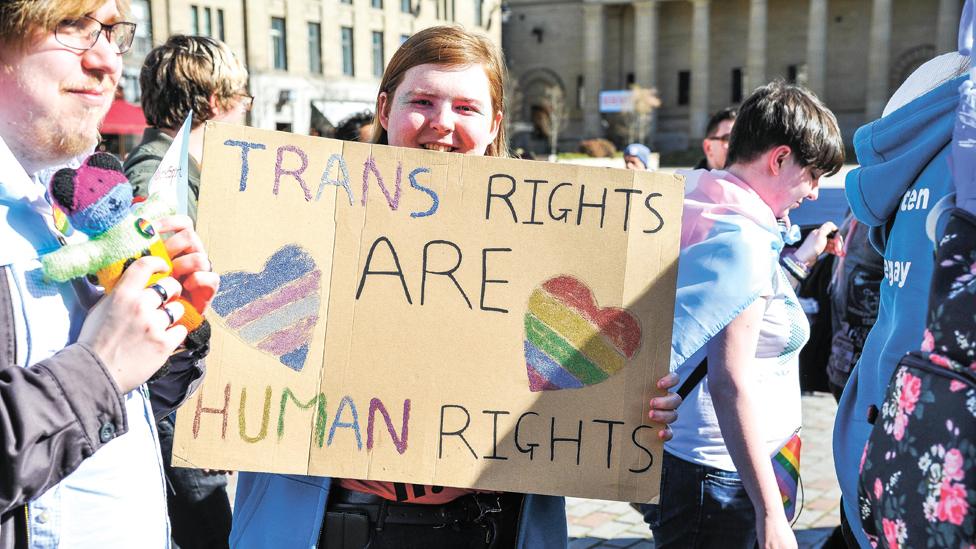Government wins legal case over definition of woman
- Published

A court has thrown out a challenge against the Scottish government's definition of a woman in law.
The For Women Scotland group complained about the way a bill aimed at gender balance on boards had included trans people under the definition of women.
They won an initial challenge earlier in 2022, but went back to court saying the law still conflates sex and gender.
Judge Lady Haldane said that the definition of sex was "not limited to biological or birth sex", external.
She said it could also include people with a gender recognition certificate after changing their legally recognised gender.
The judge also stated that sex and gender reassignment were separate and distinct characteristics but were not necessarily mutually exclusive.
In her decision, Lady Haldane wrote: "I conclude that in this context, which is the meaning of sex for the purposes of the 2010 Act, 'sex' is not limited to biological or birth sex, but includes those in possession of a GRC obtained in accordance with the 2004 Act stating their acquired gender, and thus their sex."
The judgement comes the week before controversial Scottish government plans to make it easier for people to change their legally recognised gender are due to face a final vote at Holyrood.
The case centred on the Gender Representation on Public Boards Act, which was passed by MSPs in 2018.
The legislation aims to ensure gender balance on public sector boards, and originally stated that the quota should include people who were living as a woman and who either had gone through or intended to go through the gender recognition process.
For Women Scotland argued that ministers had broken with the definitions laid out in the 2010 Equality Act, which includes separate protections on the basis of sex and of gender reassignment.
The group lost an initial judicial review, but were successful on appeal when Lady Dorrian ruled that the bill "conflates and confuses two separate and distinct protected characteristics".
However the Scottish government responded by changing the guidance notes for the bill to say that it includes both women as defined by the Equality Act, and people with a gender recognition certificate as defined under the 2004 Gender Recognition Act.

The case was heard at the Court of Session in Edinburgh
It quotes directly from that Act, to say that "where a full gender recognition certificate has been issued to a person that their acquired gender is female, the person's sex is of a woman".
For Women Scotland argued that by making reference to sex, the government was "still confusing the protected characteristics and are trying to redefine 'woman' yet again".
However this was rejected by Lady Haldane, who concluded that: "The revised statutory guidance issued by the Scottish Ministers is lawful".
Susan Smith, co-director of For Women Scotland, said the group was "obviously disappointed" with the ruling and would be looking at grounds for appeal.
But she said it had provided clarity about what a gender recognition certificate (GRC) provides for, ahead of MSPs debating reforms to make it easier to obtain one.
Argued the opposite'
She said: "What a GRC does was never spelled out. We asked the Scottish government if they could give us their interpretation of what it meant for someone to have a GRC, and they said it was a simple administrative change and made no difference.
"And then they went into court and argued the opposite, and they've won. But it does mean they've been saying one thing to the courts and another thing to parliament."
Ms Smith also suggested that the legislation currently going through parliament could be challenged too, saying it "potentially trespasses on reserved matters".


The Holyrood bill at the heart of this challenge was really just the vehicle for a broader question about the roles of two big pieces of Westminster legislation - the Gender Recognition Act of 2004, and the 2010 Equality Act.
In short, how does a certificate granted under the 2004 Act affect one's right to protections under the 2010 Act?
For Women Scotland and the Conservatives say the ruling reveals that a gender recognition certificate effectively counts as a change of sex under the Equality Act.
They say that has implications for the single-sex spaces and services that women are entitled to under that law.
Those on the other side of the debate insist that it does nothing of the sort - rather it simply reiterates the position as they had always understood it.
They say trans people can still be barred from women-only spaces, certificate or no.
This is very timely because the row now moves back into parliament, where MSPs are finalising plans to make it easier to obtain a gender recognition certificate.
This ruling is sure to be cited during next week's debate. On an issue which provokes strong feelings on both sides, it may be less sure to settle anything conclusively.

Two other groups - the Equality Network and Scottish Trans - said the ruling "confirms the position and we and many others have understood it to be for well over a decade".
They added: "This ruling does not affect the exceptions in the Equality Act which mean that single-sex services can exclude trans people or treat them less favourable where it is a proportionate means to a legitimate aim.
"In short, the ruling confirms the status quo and the rights of women and trans people under it."
A spokesman for the Scottish government said: "We are pleased to note the outcome of this challenge."
During a two-day hearing in November, For Women Scotland's KC Aidan O'Neill argued that a gender recognition certificate should not "result in a change of sex".
He said the court should bring the Gender Recognition Act "back down to earth", arguing that "sex means biological sex, that man means biological man, that woman means biological woman".
However the Scottish government's KC Ruth Crawford said the case had nothing to do with the process of getting a certificate or its effect in law.
She said the 2004 Act was "unambiguous" that a certificate provided for a change of sex, and that "there is nothing in the 2010 Act which takes away from the fundamental proposition" of that.